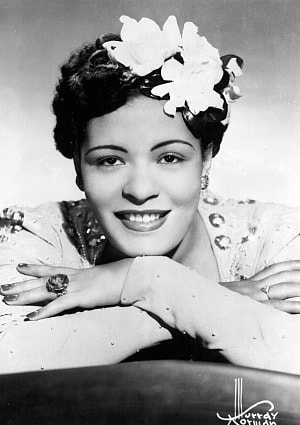Billie Holiday

Billie Holiday was an American icon and one of Jazz’s most important vocalists. Her life was filled with struggle and hardship, and not surprisingly, a Hollywood movie Lady Sings The Blues (1972) was made on her life. Born Eleanora Fagan on April 7, 1915 she grew up in a household with an absentee father as her parents married when she was three. At age ten she was a rape victim and sent to a reform school. By age 14, she was arrested for prostitution. Holiday moved to New York City in 1928.
Her first gig was at Jerry Preston’s Log Cabin. Producer John Hammond found her performing in a Harlem club, and signed her to Columbia Records in 1932. She recorded a number of popular sides with pianist Teddy Wilson and a crack team of sidemen, and in 1937 she toured with Count Basie. Holiday was the first black artist to tour with Artie Shaw’s band as well. It was during her tenure with Shaw that she experienced the hardships and challenges on the road where segregation took place throughout the country. She quit the band when she was not allowed to enter the front door of a hotel. In 1939, she recorded her composition “Strange Fruit”.
On loan from Columbia, she recorded the song for Commodore. The graphic depictions of lynchings in the Deep South allowed the tune to become a hit, but not without controversy. Radio stations banned the song for it’s graphic subject matter, and a 1957 rendition in the pivotal Jazz film The Sound of Jazz showcased a weary, weathered Holiday, her vocals conveying a dreary sense of jaded detachment that make the performance incredibly powerful. She continued to record for Columbia until 1944.
As her career wore on Holiday had an increasing dependence on substance abuse. She was signed by the Decca label in 1944, and recorded some of her most enduring work. Holiday was arrested for drug possession in 1947 and spent a year in a rehabilitation facility. Prior to her arrest, she performed at Carnegie Hall and later barred from venues that brandished alcohol. Holiday recorded for Norman Granz’ Verve label in her final career phase, from 1952-1957. Her voice had deteriorated substantially, with some critics making strong statements about this fact. She died on July 17th, 1959 in New York City.
Billie Holiday’s legacy is incredibly important in Jazz. Though she differed from peers such as Ella Fitzgerald in the sense she did not scat sing, Holiday took creative liberties with phrasing, often going behind the beat, a hallmark of her distinctive style. A Broadway show about her life called “Lady Day” is currently running, starring noted Jazz vocalist Dee Dee Bridgewater.
If you would like to learn more about Billie Holiday and how to sing jazz standards check out the New York Jazz vocal workshops with Fay Vitor and Olivia Foschi under weekly vocal classes and summer vocal intensives.
I have been the staff writer for the New York Jazz Workshop School of Music blog in midtown Manhattan since 2014, and that has broadened my freelance writing skills considerably. In addition to writing artist bios, and articles of interest that pertain to the mission of the school, I have interviewed (in print on the site) legendary guitarist and NEA Jazz Master Pat Metheny, trumpeter Cuong Vu, and in 2015 embarked on producing a podcast for the school where I have achieved my dream and interviewed jazz giants such as Dave Liebman, Lenny White, rising talents like Thana Alexa, Logan Richardson, guitarist and bassist Brian Kastan, among others. I also work on SEO optimization for the blog. In 2015 I started my blog Jazz Views with CJ Shearn, and have written liner notes for 5 time Grammy winner and Oscar and Golden Globe nominee, Antonio Sanchez (for his latest recording “Channels of Energy”) and guitarist Gene Ess for his latest recording, scheduled to be released in November 2018.
My passion for jazz music is what drives me, which is an interest I’ve had since I can remember. I initially began writing about jazz at the age of 13 for my high school newspaper, and in my late teens contributed occasionally to jazzreview.com. In college I was member of the Harpur Jazz Project which brought jazz acts to campus. I’ve also contributed in the past to AllAboutJazz where I was mentored by John Kelman. I decided to focus on my passion for jazz music journalism after a job in the social services field as a caseworker went south, and as a person with a physical disability I work on going against the odds, living independently and having accomplished things people had said I’d never do.
